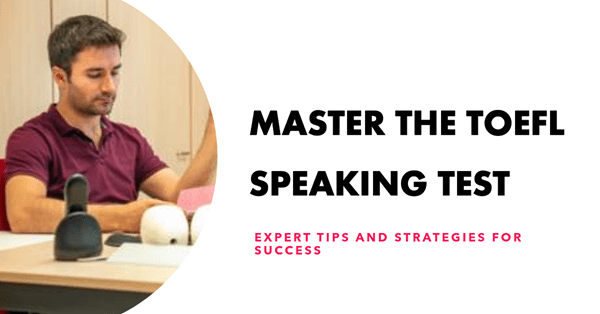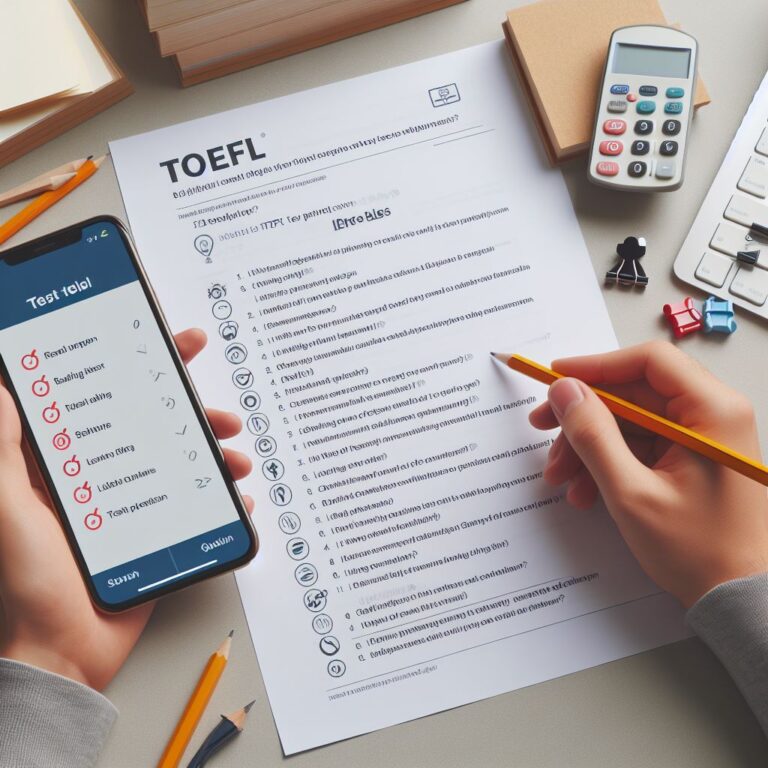Ace the TOEFL Speaking Section: A Complete Guide
What you will find in this guide:

Introduction
Most people consider the TOEFL iBT speaking an unwinnable battle because it requires you to read, listen and speak in English in a short amount of time2.! However, this test can be a breeze if you have the right training for it. This is exactly what we do, and this guide is for. So, if you want to navigate the TOEFL iBT Speaking like a champ, keep reading this article. We are here to help you with some tips and strategies to ace the TOEFL speaking section. In this article, we will explain the format of the section, the types of questions you will encounter, and how to answer them effectively.
TOEFL iBT Speaking Format
The speaking section is the third part of the TOEFL test. You will have about 17 minutes to answer four questions. The questions are divided into two categories: independent and integrated.
- Independent questions ask you to give your opinion on a topic related to school, work or life. You will have 15 seconds to prepare and 45 seconds to speak.
- Integrated questions ask you to summarize information from a reading and a listening passage. You will have 30 seconds to prepare and 60 seconds to speak.
You will wear a headset and speak into a microphone. Your responses will be recorded and scored by human raters based on your delivery, language use, and topic development.
Get the Question Types Right
There are four types of TOEFL speaking questions, each with a different purpose and structure. Here is a brief overview of each type:
- Question 1: Personal Choice1. This is an independent question that asks you to state whether you agree or disagree with a statement, or to choose between two options. You need to provide one or two reasons to support your opinion, using specific details and examples.
- Question 2: Campus Announcement. This is an integrated question that asks you to summarize the opinion of a student from a reading and a listening passage. The reading passage describes a change or a proposal on a university campus, and the listening passage is a conversation between two students who discuss the change or the proposal. You need to state the student’s opinion and the reasons he or she gives for holding that opinion.
- Question 3: General to Specific. This is an integrated question that asks you to summarize a concept and an example from a reading and a listening passage. The reading passage defines an academic term or concept, and the listening passage is a lecture that provides one or two examples of the term or concept. You need to explain the concept and the examples using your own words.
- Question 4: Academic Lecture. This is an integrated question that asks you to summarize a process and an example from a listening passage. The listening passage is a lecture that describes how something is done or how something works, using one or two examples. You need to explain the process and the examples using your own words.
How to Ace TOEFL Speaking Questions
To answer TOEFL speaking questions effectively, you need to follow a clear and organized structure. Here are some general tips and guidelines for each type of question:
- Question 1: Personal Choice. Start with a clear main point that states your opinion or preference. Then, give one or two reasons to support it, using conjunctions and transitional phrases to show the logical connection. Finally, provide specific details and examples to illustrate your reasons, such as personal experiences, facts, or statistics.
- Question 2: Campus Announcement. Start with a brief introduction that summarizes the main idea of the reading passage. Then, state the opinion of the student from the listening passage and the reasons he or she gives for holding that opinion. Make sure to use contrast words and phrases to show the difference between the reading and the listening passages, such as however, on the other hand, or in contrast.
- Question 3: General to Specific. Start with a brief introduction that summarizes the concept from the reading passage. Then, explain the examples from the listening passage, using words and phrases to show the connection between the concept and the examples, such as for instance, for example, or such as. Make sure to use your own words and avoid repeating the exact words from the passages.
- Question 4: Academic Lecture. Start with a brief introduction that summarizes the topic of the lecture. Then, explain the process and the examples from the lecture, using words and phrases to show the sequence and the steps, such as first, second, then, next, or finally. Make sure to use your own words and avoid repeating the exact words from the lecture.
The Best Way to Practice for the TOEFL Speaking Section
To practice for the TOEFL speaking section, you need to do more than just speak. You also need to practice your reading and listening skills, as well as your time management and note-taking skills. Here are some resources and tools that can help you:
- TOEFL Speaking Master Guides. These are detailed guides that explain each type of question, provide sample questions and answers, and offer templates and tips to improve your score. You can find them here: A detailed guide to TOEFL Speaking Question One (Personal Choice), A detailed guide to TOEFL Speaking Question Two (Campus Announcement), A detailed guide to TOEFL Speaking Question Three (General to Specific), A detailed guide to TOEFL Speaking Question Four (Academic Lecture).
- TOEFL Speaking Evaluation Service. This is a service that allows you to have your practice recordings evaluated by a TOEFL speaking expert. You will receive feedback on your delivery, language use, topic development, and structure. You can sign up for it here: TOEFL Speaking Evaluation Service.
- TOEFL Speaking Sample Answers. These are recorded answers to TOEFL speaking questions by a native speaker. You can listen to them and learn from them. You can find them here: TOEFL Speaking Sample Answers.
We hope this article has given you some useful information and advice on how to ace the TOEFL speaking section. Remember that practice makes perfect, so keep working hard and you will achieve your desired score. Good luck!
FAQ
The TOEFL speaking questions are scored by human raters on a scale of 0 to 4. The raters evaluate your delivery, language use, topic development and structure. The scores of the four questions are converted to a scaled score of 0 to 30.
It measures your ability to speak English in academic and everyday situations. You will answer four questions in about 17 minutes. The questions are based on reading, listening and speaking tasks.
You can prepare for the TOEFL speaking section by practicing with sample questions, recording your answers, and getting feedback from a TOEFL speaking expert. You can also check out our detailed guides, templates and tips for each question type.






